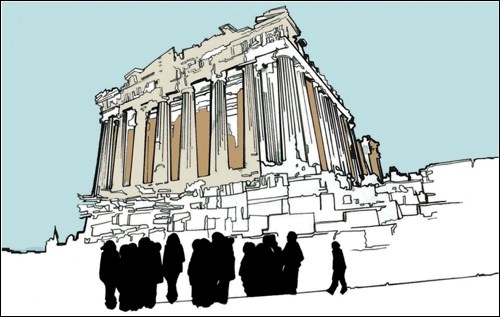RHODES, Greece — The deep recession that gripped Greece for the last five years has taken the wind out of the national economy and caused an economic train wreck.
The recession has devastated businesses and scarred every Greek family. It is responsible for a contraction in gross domestic product (GDP) of 25 per cent, contributed to a public debt of 320 billion Euros, left thousands of businesses bankrupt, catapulted the national unemployment rate to 26 per cent and left six out of 10 youth out of work.
A trio of international creditors - the European Central Bank, the European Commission and the International Monetary Fund - extended an economic lifeline to Greece in the form of two bailouts amounting to 242.8 billion Euros. Those bailouts, however, demanded the imposition of austerity measures and a checklist for Greece to clean up its economic act.
The austerity measures included layoffs in the civil service, the realignment of salaries in the public sector with those in the private sector, a one-third reduction in pensions, the extension of the retirement age from 65 to 67 and increases in personal income taxes, property taxes and the value added tax.
Throughout all of this, the Greek economy sputtered along. Those businesses that did not go bankrupt cut expenses, reduced staff and managed to cope. The Greek people tightened their belts, made do with less and survived the best they could. The prevailing public mood was one of coasting along, rolling with the economic punches and hoping that the Greek economy will recover.
All of this changed on the fateful day of June 29, when the Greek government ordered the banks to close their doors. It was at this moment that the government and the people of Greece realized the magnitude and severity of the economic crisis. On that day, Greece woke up to the fact that the economic apocalypse had arrived.
Along with the devastating economic metrics, the Greek economic apocalypse had a human face. It took the form of depositors lining up for hours to get their daily allowance of 60 Euros from an ATM, seniors queuing up in the 40-degree sweltering heat in order to get their weekly pension of 120 Euros, businesses unable to pay their employees, exporters unable to conduct their financial transactions and tourists cancelling their reservations because of the financial inconvenience.
Faced with little choice, the Greek government made a 180-degree political turn by abandoning its defiant stand against the austerity measures and reforms demanded by the international creditors. It essentially raised a white flag and accepted the harshest and most punitive measures associated with an international loan.
The Greek people, faced with the reality of a Grexit that spelled the end of their association with the unified currency of the euro zone including the prospects of being forced out of the European Union, took a collective deep breath and reluctantly admitted that a third bailout was the only pragmatic way to salvage a dying economy.
In consequence, negotiations have started this week between Greece and its international creditors for a third bailout worth 86 billion Euros. The austerity conditions for a third financial lifeline are brutal and uncompromising. The sad part of this unravelling economic drama is that it will only buy Greece more time.
Unless a new economic growth plan is implemented, an enhanced international trade strategy is embraced, a concerted effort to attract foreign investment is pursued and structural reforms of its economic governance institutions are undertaken, Greece will be back at the bargaining table for a fourth handout within five years.
University of New Brunswick economics professor Dr. Constantine Passaris is in Greece as a visiting professor at the International Writers Center of Rhodes (Greece).
www.troymedia.com




